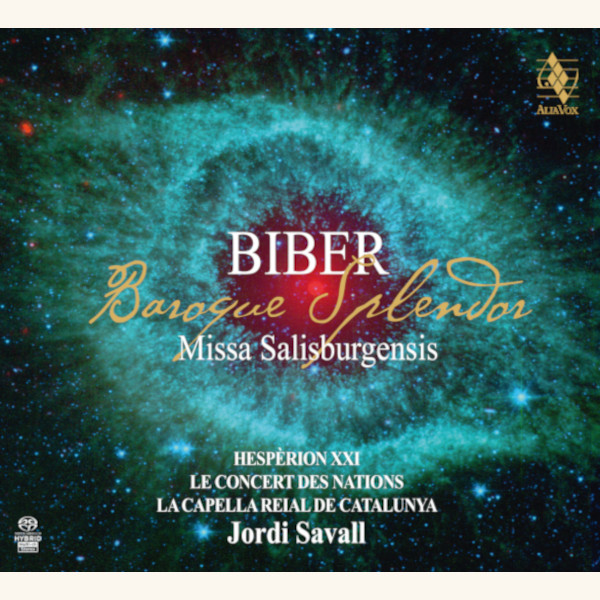H. I. F. VON BIBER
Baroque Splendor · Missa Salisburgensis
Hespèrion XXI, Jordi Savall, La Capella Reial de Catalunya, Le Concert des Nations
17,99€
Reference: AVSA9912
- Le Concert des Nations
- La Capella Reial de Catalunya
- Hespèrion XXI
- Direcció: Jordi Savall
Like a great, mysterious nebula, the dazzling Missa Salisburgensis arches over the world of polychoral music by virtue of the exceptional complexity and richness of its means, which are deployed to create a unique expression in sound and space, symbolising with extraordinary exuberance and efficiency all the strength and grandeur of divine power, political and religious power. Shrouded in mystery and regarded by specialists as the Everest of polychoral compositions, this work was discovered by a Salzburg grocer in 1870. At first it was mistakenly attributed to the composer Orazio Benevoli, but now, as Professor Ernst Hintermaier explains (see his accompanying commentary), it is unanimously considered to be among the masterpieces of Heinrich Ignaz Franz Biber, one of the greatest and most talented Austrian composers of the Baroque period.
Like a great, mysterious nebula, the dazzling Missa Salisburgensis arches over the world of polychoral music by virtue of the exceptional complexity and richness of its means, which are deployed to create a unique expression in sound and space, symbolising with extraordinary exuberance and efficiency all the strength and grandeur of divine power, political and religious power. Shrouded in mystery and regarded by specialists as the Everest of polychoral compositions, this work was discovered by a Salzburg grocer in 1870. At first it was mistakenly attributed to the composer Orazio Benevoli, but now, as Professor Ernst Hintermaier explains (see his accompanying commentary), it is unanimously considered to be among the masterpieces of Heinrich Ignaz Franz Biber, one of the greatest and most talented Austrian composers of the Baroque period.
More than 15 years ago, I was fortunate to have my first experience performing Biber’s sacred music. It was in late May 1999, and I was preparing a concert featuring the Requiem and the Missa Bruxellensis XXIII vocum to be given at Salzburg Cathedral during the Pfingsten Barock Festival. This event provided me with the opportunity to acquire a profound understanding of the complexity of Biber’s polyphonic and polychoral style and, most importantly, to experience it in the acoustic conditions of the cathedral where Biber’s works had received their first public performance during the composer’s lifetime. Thanks to the intense work carried out, we were able to take the opportunity afforded by the concert to make the first live recordings of the Mass as well as the Requiem, two unique versions which we released under our label Alia Vox in 1999 and 2002, respectively.
Fifteen years later, in 2014, we were invited to the Konzerthaus in Vienna during the Resonanzen Festival to perform Biber’s other great Mass, the Missa Salisburgensis à 54 (Vocum), one of the pinnacles of sacred music of all time, and the motet “Plaudite tympana,” which were also composed to mark the 1100th anniversary of the foundation of the archbishopric of Salzburg by St Rupert. To complement the programme we have selected Bartolomaus Riedl’s slightly earlier Fanfares, together with Biber’s Sonata Sancti Polycarpi à 9 and his Battalia à 10, composed in 1673.
+ information in the CD booklet
JORDI SAVALL
Salzburg, 27th July 2015
Translated by Jacqueline Minett







Share